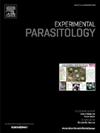暴露于双酚a会增加对克氏锥虫感染的易感性
IF 1.6
4区 医学
Q3 PARASITOLOGY
引用次数: 0
摘要
双酚a (BPA)是一种内分泌干扰物,会干扰体内的荷尔蒙和化学信号,对健康产生负面影响。这种破坏的一个目标是免疫系统。虽然BPA与某些病原体感染的易感性增加有关,但其对原生动物寄生虫感染的影响仍未得到充分研究。本研究评估了BPA暴露对BALB/c小鼠实验性克氏锥虫寄生虫病的影响。BALB/c小鼠的寄生虫血症通过Neubauer室中的寄生虫计数来评估。此外,采用ELISA法鉴定抗体的存在,采用RT-PCR分析细胞因子基因表达,并采用酶动力学方法定量肝脏标志物水平。暴露于BPA前和暴露于BPA后均增加了克氏锥虫感染期间的寄生虫血症,并降低了IgG1、IgG2a和IgG2b同型的水平。此外,BPA在感染反应中调节促炎细胞因子的表达。此外,与对照组相比,所有暴露于BPA的小鼠的肝酶都发生了变化。这些结果表明,在感染T. cruzi的关键时期,免疫系统对BPA暴露高度敏感,增加了对寄生虫的易感性。本文章由计算机程序翻译,如有差异,请以英文原文为准。
Exposure to Bisphenol-A increases susceptibility to Trypanosoma cruzi infection
Bisphenol-A (BPA), an endocrine disruptor, disrupts hormonal and chemical signaling within the body, negatively impacting health. One target of this disruption is the immune system. While BPA has been implicated in increased susceptibility to some pathogen infections, its effects on protozoan parasite infections remain understudied. This work evaluated the effect of BPA exposure on experimental Trypanosoma cruzi parasitemia in BALB/c mice.
Parasitemia was evaluated in BALB/c mice by counting parasites in a Neubauer chamber. Additionally, ELISA assays were used to identify the presence of antibodies, cytokine gene expression was analyzed by RT-PCR, and liver marker levels were quantified using enzymatic kinetic methods. Both pre- and post-exposure to BPA increased parasitemia during T. cruzi infection and decreased levels of IgG1, IgG2a, and IgG2b isotypes. Furthermore, BPA modulated the expression of pro-inflammatory cytokines in response to infection. In addition, all mice exposed to BPA showed alterations in liver enzymes compared to the control group. These results demonstrate that the immune system during critical periods of T. cruzi infection is highly sensitive to BPA exposure, increasing susceptibility to the parasite.
求助全文
通过发布文献求助,成功后即可免费获取论文全文。
去求助
来源期刊

Experimental parasitology
医学-寄生虫学
CiteScore
3.10
自引率
4.80%
发文量
160
审稿时长
3 months
期刊介绍:
Experimental Parasitology emphasizes modern approaches to parasitology, including molecular biology and immunology. The journal features original research papers on the physiological, metabolic, immunologic, biochemical, nutritional, and chemotherapeutic aspects of parasites and host-parasite relationships.
 求助内容:
求助内容: 应助结果提醒方式:
应助结果提醒方式:


